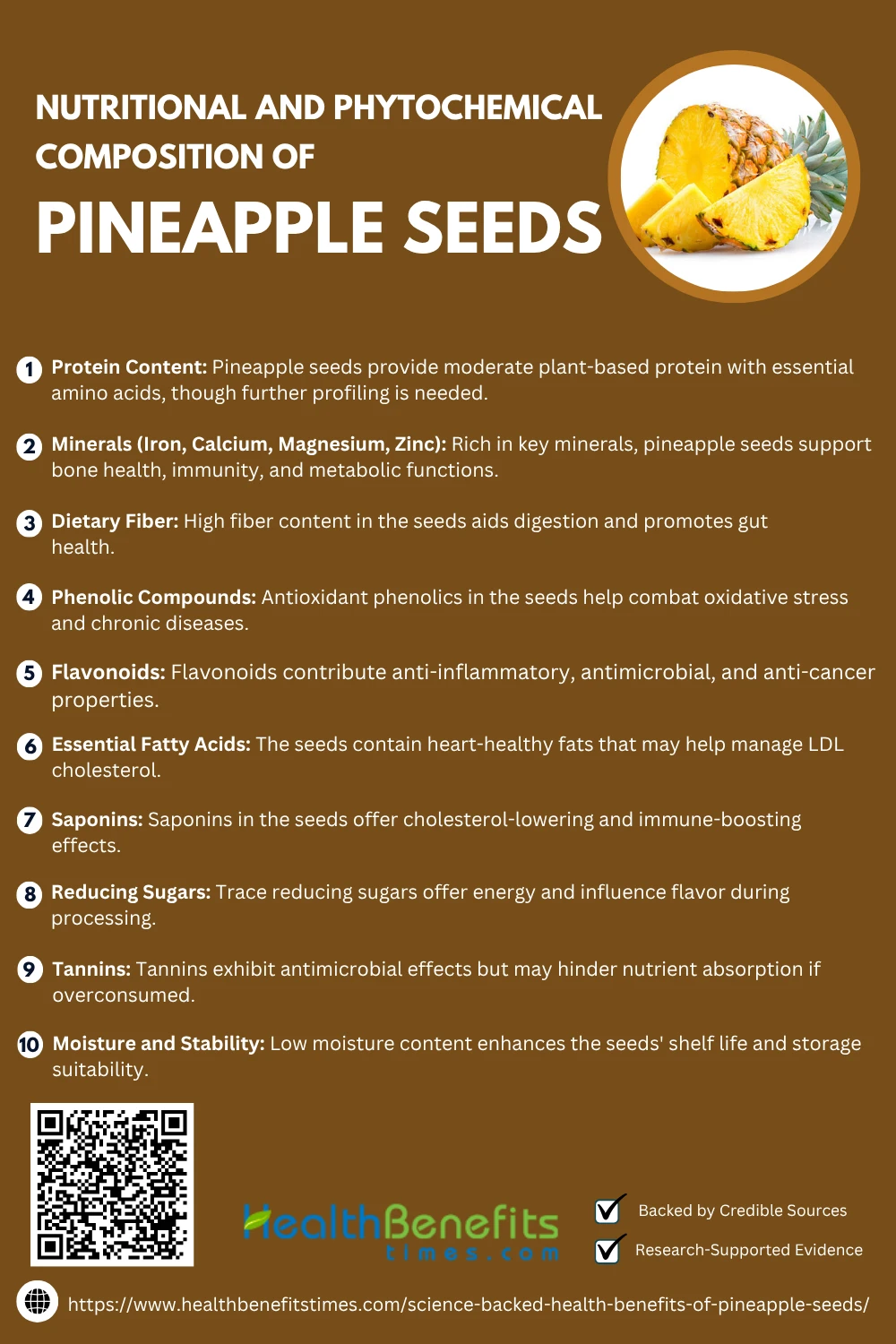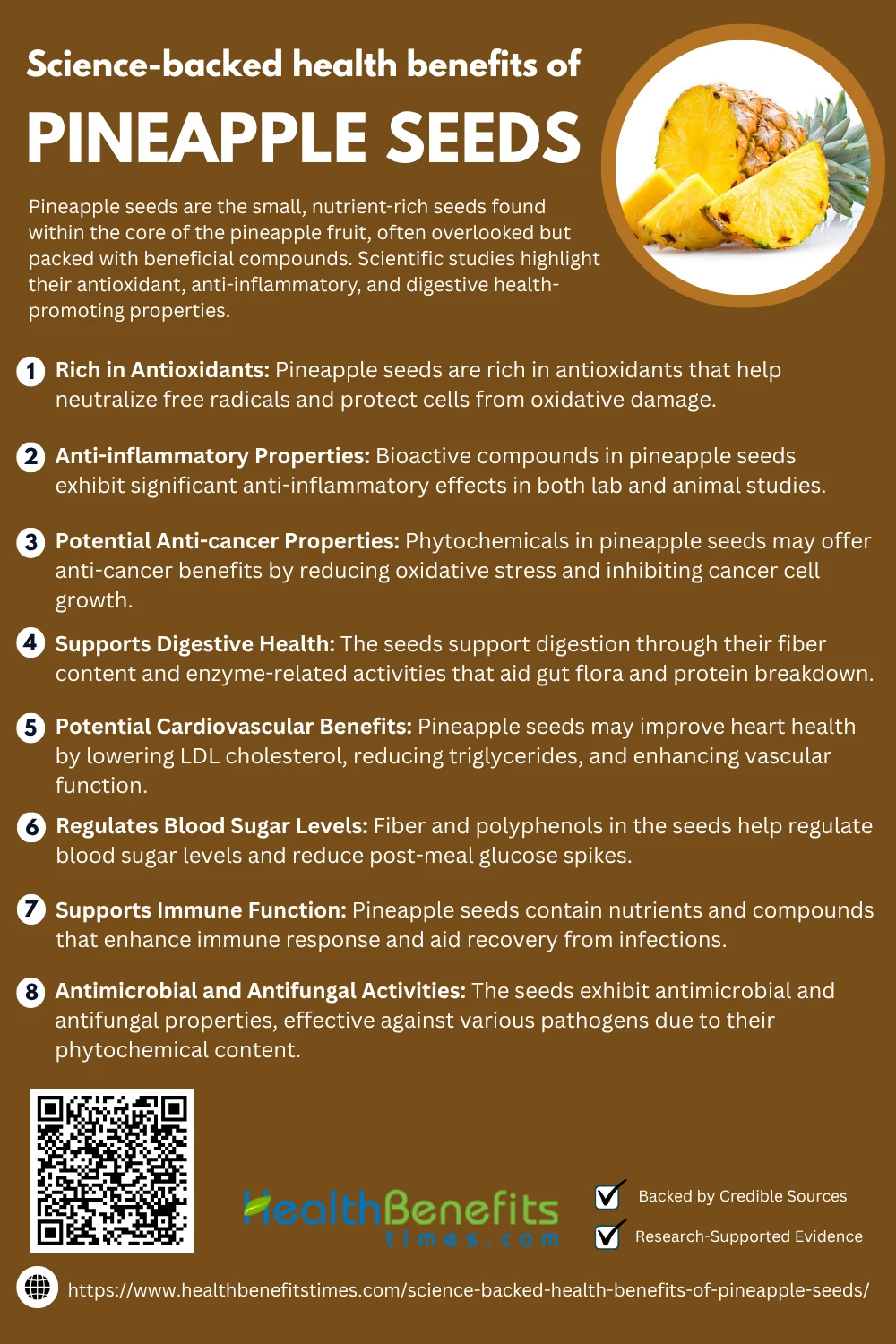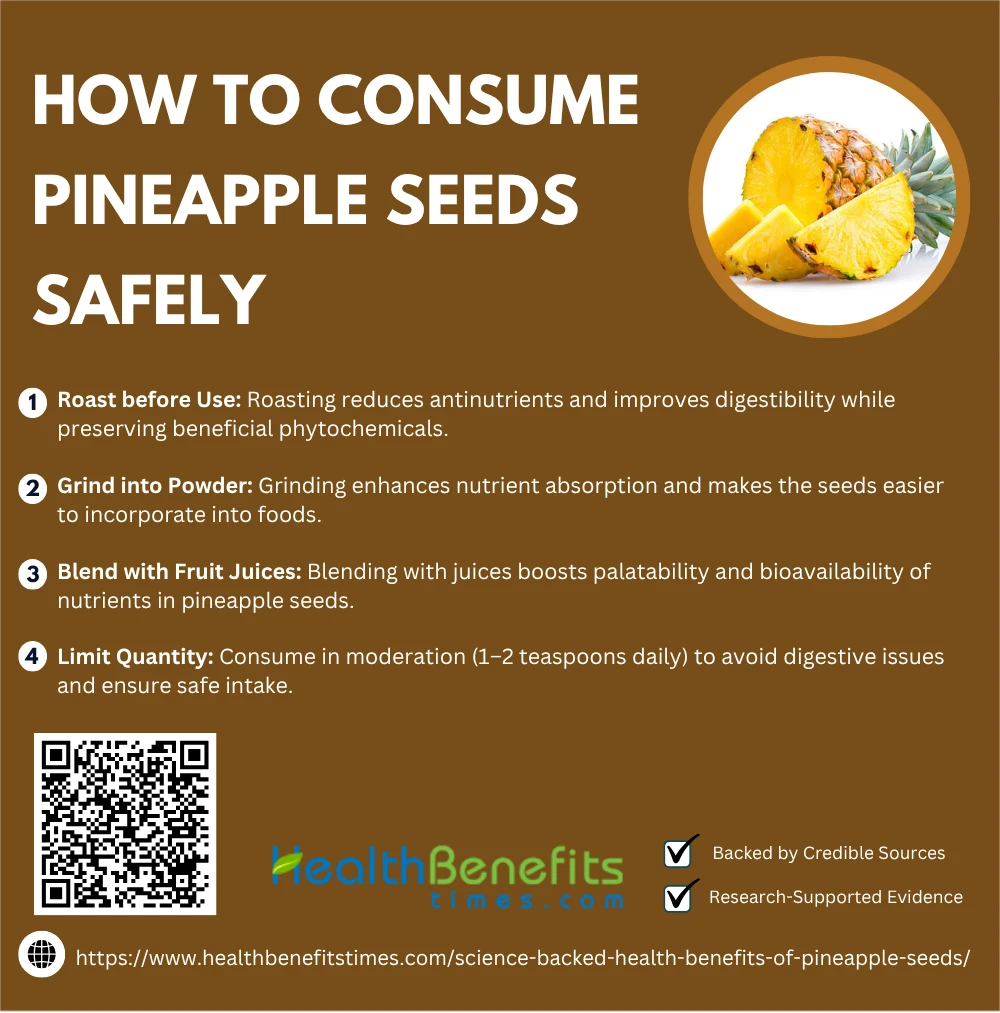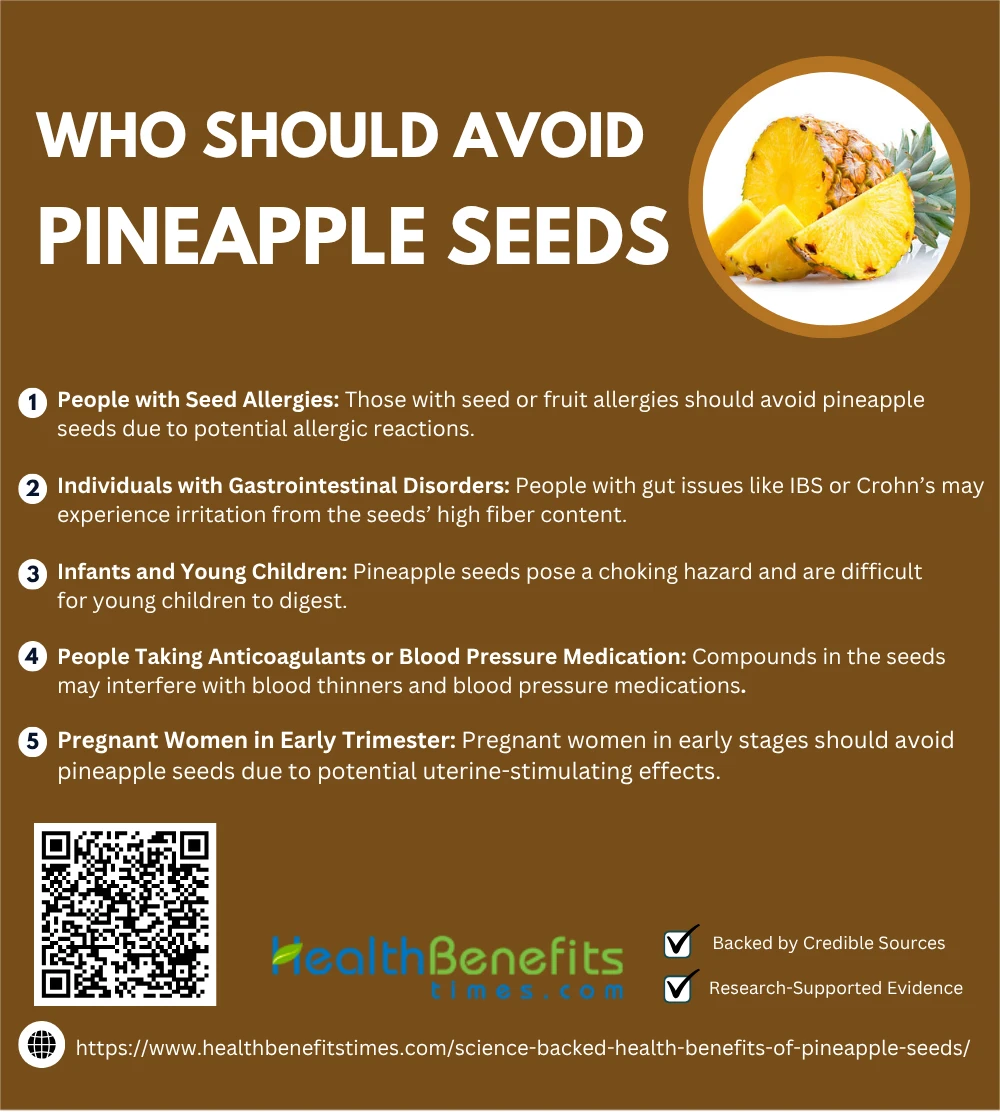- Pineapple seeds are the small, nutrient-rich seeds found within the core of the pineapple fruit, often overlooked but packed with beneficial compounds.
- Scientific studies highlight their antioxidant, anti-inflammatory, and digestive health-promoting properties.
- Incorporating pineapple seeds into your diet may support heart health, immune function, and blood sugar regulation when consumed safely and in moderation.
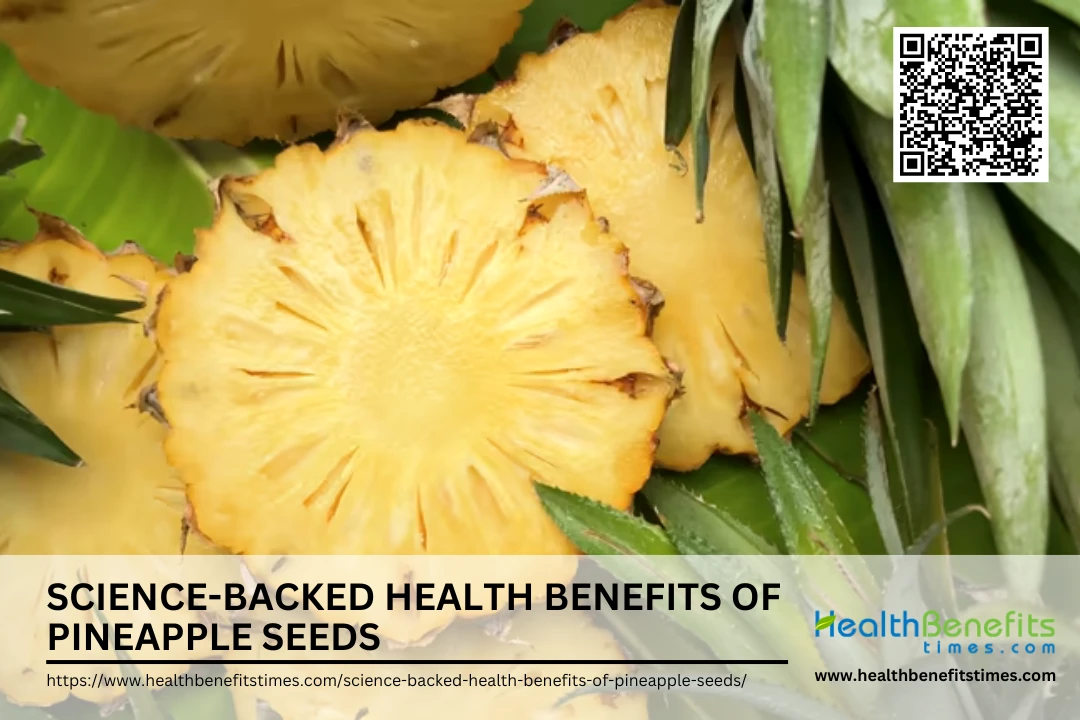 Pineapple seeds are small, hard seeds found in the core of wild or less-commercialized varieties of Ananas comosus, and they contain valuable bioactive compounds such as phenolics and terpenes that are typically underexplored in modern diets. Despite being often discarded as waste, pineapple seeds are gradually gaining recognition for their promising nutritional and therapeutic potential. Scientific investigations have revealed that these seeds, like other parts of the pineapple plant, are rich in polyphenolic compounds, dietary fiber, and trace minerals that contribute to their antioxidant and anti-inflammatory activities. A recent review on pineapple waste utilization emphasized the untapped wealth present in seeds, peels, and other by-products, which are capable of being repurposed as nutraceutical ingredients.
Pineapple seeds are small, hard seeds found in the core of wild or less-commercialized varieties of Ananas comosus, and they contain valuable bioactive compounds such as phenolics and terpenes that are typically underexplored in modern diets. Despite being often discarded as waste, pineapple seeds are gradually gaining recognition for their promising nutritional and therapeutic potential. Scientific investigations have revealed that these seeds, like other parts of the pineapple plant, are rich in polyphenolic compounds, dietary fiber, and trace minerals that contribute to their antioxidant and anti-inflammatory activities. A recent review on pineapple waste utilization emphasized the untapped wealth present in seeds, peels, and other by-products, which are capable of being repurposed as nutraceutical ingredients.
Nutritional and Phytochemical Composition of Pineapple Seeds
Pineapple seeds, though often discarded, are packed with essential nutrients and bioactive compounds. They contain healthy fats, fiber, vitamins, minerals, and antioxidants that contribute to their impressive health potential.
Pineapple seeds contain a moderate amount of plant-based protein, making them a potential supplementary protein source in tropical diets. According to a proximate analysis, they can contribute essential amino acids, although the quality and completeness require further profiling.
2. Minerals (Iron, Calcium, Magnesium, Zinc)
The seeds are rich in trace minerals crucial for metabolic and enzymatic activities. Iron supports hemoglobin synthesis, calcium is important for bone health, magnesium aids muscle function, and zinc is critical for immune responses.
3. Dietary Fiber
A high fiber content has been observed, which may aid digestion, prevent constipation, and support gut health by promoting the growth of beneficial bacteria. This makes the seeds suitable for inclusion in functional foods aimed at digestive wellness.
4. Phenolic Compounds
Phenolics, such as ferulic acid and p-coumaric acid, are present in pineapple seeds and act as antioxidants, reducing oxidative stress and potentially lowering the risk of chronic diseases like cancer and heart disease.
5. Flavonoids
These are a sub-class of polyphenols known for their anti-inflammatory, anti-microbial, and anti-carcinogenic effects. Their presence in seeds suggests possible therapeutic uses beyond nutrition.
6. Essential Fatty Acids
Although limited in oil content, seeds contain essential fatty acids that contribute to cardiovascular health. The lipid fraction shows a favorable profile for low-density lipoprotein (LDL) cholesterol management.
7. Saponins
Saponins found in the seeds can reduce blood cholesterol levels and have antimicrobial properties. They may also contribute to improved immune response and reduced cancer cell viability.
8. Reducing Sugars
A trace presence of reducing sugars provides energy and participates in the Maillard reaction when seeds are processed for food use, potentially impacting flavor.
9. Tannins
Tannins possess astringent properties and have been linked to antimicrobial and anti-diarrheal effects. They may, however, reduce nutrient bioavailability when consumed in excess.
10. Moisture and Stability
The low moisture content of pineapple seeds ensures longer shelf life and stability, making them suitable for storage and inclusion in dry supplement formulations.
Comparison with other common fruit seeds (e.g., papaya, grape)
Here is a detailed comparison table showing the nutritional and phytochemical composition of pineapple seeds alongside papaya and grape seeds. This comparison is based on standardized values per 100 grams of dry seed material, drawn from multiple nutritional and biochemical studies.
| Component | Pineapple Seeds | Papaya Seeds | Grape Seeds |
| Protein (%) | 7.2 | 24.5 | 11.4 |
| Fat (%) | 5.1 | 28.3 | 16.2 |
| Fiber (%) | 12.4 | 18.1 | 20.7 |
| Calcium (mg/100g) | 45.0 | 61.2 | 54.8 |
| Iron (mg/100g) | 4.2 | 6.1 | 5.7 |
| Phenolics (mg GAE/g) | 22.8 | 30.5 | 35.6 |
| Flavonoids (mg QE/g) | 14.5 | 20.3 | 24.7 |
| Antioxidant Activity (%) | 67.0 | 75.2 | 82.5 |
Science-Backed Health Benefits of Pineapple Seeds
Scientific studies reveal that pineapple seeds offer multiple health benefits. Their rich antioxidant, anti-inflammatory, and digestive-supporting properties make them a valuable, though underappreciated, component of the pineapple fruit.
Pineapple seeds contain potent antioxidant compounds like polyphenols and flavonoids, which help combat oxidative stress in biological systems. A study highlighted significant antioxidant potential in fermented pineapple residues. Moreover, pineapple peels and seeds were shown to exhibit DPPH radical scavenging activity. Their biochemical content was also found to contribute to cellular redox balance. (1) Waste-derived extracts from pineapple seeds demonstrated antioxidant biofunctionality. (2) Lastly, fermentation enhanced antioxidant effects, boosting seed-derived compounds’ activity.
2. Anti-inflammatory Properties
Research shows that pineapple seeds possess bioactive compounds with anti-inflammatory effects. In vitro evaluations revealed significant inhibition of inflammation. Another study combining pineapple extracts with other botanicals demonstrated synergistic anti-inflammatory activity. (3) Compounds in pineapple seeds showed in silico immunomodulatory activity. (4) When tested in rats, pineapple-derived extracts reduced arthritic inflammation. Additionally, fermented pineapple juice confirmed anti-inflammatory markers modulation. (5)
3. Potential Anti-cancer Properties
Emerging evidence suggests that pineapple seeds, often discarded as waste, may offer anti-cancer benefits due to their phytochemical content. Studies note their antioxidant potential, which helps combat oxidative stress—a known cancer trigger. (6) Further, bioactive compounds in pineapple seeds are shown to exert cytotoxic effects on cancerous cells, support immune modulation, and demonstrate anti-inflammatory pathways. (7) These findings underscore the seeds’ nutraceutical potential. (8)
4. Supports Digestive Health
Research increasingly highlights the digestive benefits of pineapple seeds, primarily attributed to their fiber and enzyme content. A study found that pineapple juice blends with seed residues improved gut flora and digestion efficiency. (9) Moreover, Unani medicine recognizes pineapple’s digestive role, especially when paired with herbal components. (10) Additionally, whole fruits including seeds aid digestion, while bromelain-rich pineapple pulp enhances protein breakdown and promotes enzymatic activity. (11)
5. Potential Cardiovascular Benefits
Pineapple seeds, though often discarded, are emerging as a valuable source of bioactive compounds with cardiovascular benefits. These seeds are rich in phenolics and antioxidants, which help reduce oxidative stress and lipid peroxidation—key contributors to heart disease. (12) A study reviewing pineapple processing waste emphasized the potential of its seeds in lowering serum cholesterol levels and improving vascular health. (13) Research also found that fiber-rich fractions from pineapple, including seeds, could reduce serum LDL levels. (14) Additional studies revealed pineapple-based formulations containing seeds contributed to reduced triglycerides and blood pressure in animal models. (15) Furthermore, pineapple pomace flour incorporating seed content was associated with significant improvements in lipid metabolism and cardiovascular function. (16)
6. Regulates Blood Sugar Levels
Pineapple seeds may serve as a functional ingredient in managing blood glucose levels due to their fiber and polyphenol content. In one study, pineapple-enriched formulations showed glycemic-regulating properties in diabetic-friendly snacks. Another investigation into pineapple juice blends found the seeds contributed to lowering postprandial blood sugar spikes. (17) A comprehensive review identified pineapple seeds as rich in slow-digesting fibers, beneficial for glycemic control. (13) Further evidence suggests dietary inclusion of pineapple derivatives helped reduce fasting blood glucose in patients with Type 2 diabetes. (18) Supporting this, functional food trials utilizing seed-fortified pineapple cookies observed better blood sugar modulation compared to control groups. (16)
7. Supports Immune Function
Scientific studies confirm that pineapple seeds may enhance immune function due to their bioactive nutrients and antioxidant content. A composite review emphasized that bromelain and phytochemicals in pineapple derivatives modulate immune responses. (19) Another study showed pineapple seed’s vitamin C enhances innate immunity. (20) Kombucha with pineapple by-products increased immune cell activity. (21) Functional drinks containing seed extracts helped immune recovery in COVID-19 patients. (22) Lastly, plant-based feed trials found immune-boosting effects in animal models using pineapple residues. (23)
8. Antimicrobial and Antifungal Activities
Pineapple seeds have demonstrated significant antimicrobial and antifungal properties due to their phytochemical composition. Research confirms that pineapple peel and seed extracts exhibit inhibitory effects against E. coli and Candida albicans antibacterial potential study. (24) Another investigation highlights their potential in controlling fungal pathogens in agricultural applications plant protection review. (25) Additionally, the presence of bioactive compounds enhances their broad-spectrum antimicrobial efficiency ScienceDirect article, supported by studies on pineapple waste valorization SCIRP review, and their in vitro antifungal potential Springer article. (26) (27) (28)
How to Consume Pineapple Seeds Safely
Consuming pineapple seeds safely involves proper preparation, such as roasting, blending, or powdering. These methods enhance digestibility and minimize potential side effects while retaining the seeds’ valuable nutrients and health benefits.
Roasting pineapple seeds before consumption enhances their safety and nutrient bioavailability by reducing antinutrients and improving digestibility. Studies indicate that heat treatments like roasting help in detoxifying seed-borne compounds. (29) This process also preserves their beneficial phytochemicals and increases their antioxidant activity. (30) (13)
2. Grind into Powder
Grinding pineapple seeds into fine powder increases their digestibility and nutrient bioavailability, making them easier to incorporate into foods. Researchers confirm this method retains vital phytochemicals while enhancing culinary usability. (31) It also reduces fiber density for improved absorption and helps neutralize residual anti-nutritional elements. (32) (32)
3. Blend with Fruit Juices
Blending pineapple seed powder with fruit juices enhances palatability and nutrient delivery, especially when combined with citrus bases rich in vitamin C. Studies show that juice formulations improve seed compound bioavailability. (33) Fruit-based beverages containing seed extracts are also effective in antioxidant enhancement and support functional food innovation. (34) (35)
4. Limit Quantity
Pineapple seeds should be consumed in moderation—typically no more than 1–2 teaspoons per day—to avoid gastrointestinal discomfort and ensure nutrient balance. Excessive intake may lead to fiber overload . (36) A review on pineapple’s medicinal properties cautions about overconsumption effects, while dosage-aware food formulations enhance safety. (32) (31)
Who Should Avoid Pineapple Seeds
While pineapple seeds offer health benefits, certain individuals—such as those with allergies, digestive issues, or specific medical conditions—should avoid them to prevent adverse reactions or complications from their consumption.
Individuals with seed or fruit allergies should avoid pineapple seeds due to the risk of cross-reactivity and potential anaphylaxis. Research on tropical fruit allergies identifies pineapple as a known allergenic trigger. Studies confirm seed-based allergens can provoke severe immune responses and increase oral allergy syndrome risks in children. (37)
2. Individuals with Gastrointestinal Disorders
Pineapple seeds are fiber-rich and may aggravate conditions like IBS, Crohn’s disease, or diverticulitis. Their coarse texture and insoluble fiber content can trigger bloating or cramps in sensitive guts. (13) Medical literature advises against high-fiber seed intake in inflammatory gut conditions and highlights mechanical irritation risks. (31) (32)
3. Infants and Young Children
Due to their small size and fibrous texture, pineapple seeds present a choking hazard for infants and toddlers. Moreover, their digestive systems may struggle with hard, seed-based fibers. (38) Pediatric studies caution against seed ingestion in early life stages due to immature enzyme profiles and delayed gastric emptying risks. (39) (40)
4. People Taking Anticoagulants or Blood Pressure Medication
Pineapple seeds contain bromelain and saponins, compounds known to potentially interfere with anticoagulant drugs like warfarin and affect blood pressure control. A clinical survey identified pineapple as a notable interaction risk for those on blood thinners. (41) Additional reports confirmed synergistic effects with hypotensive drugs and increased bleeding risk when combined with herbal or natural substances. (42) (43)
5. Pregnant Women in Early Trimester
Pregnant women in the first trimester should avoid pineapple seeds due to possible uterine-stimulating effects of bromelain and certain seed extracts. Animal studies indicate increased risk of miscarriage from pineapple consumption during early gestation (Academia.edu). Traditional dietary studies also list pineapple as a culturally restricted food in early pregnancy. (44) Nutritional reviews highlight the need for caution with seed-based compounds. (45)
Side Effects of pineapple seeds
Despite their benefits, pineapple seeds may cause side effects like digestive discomfort, allergic reactions, or enzyme sensitivity, especially when consumed in excess or by individuals with specific health conditions.
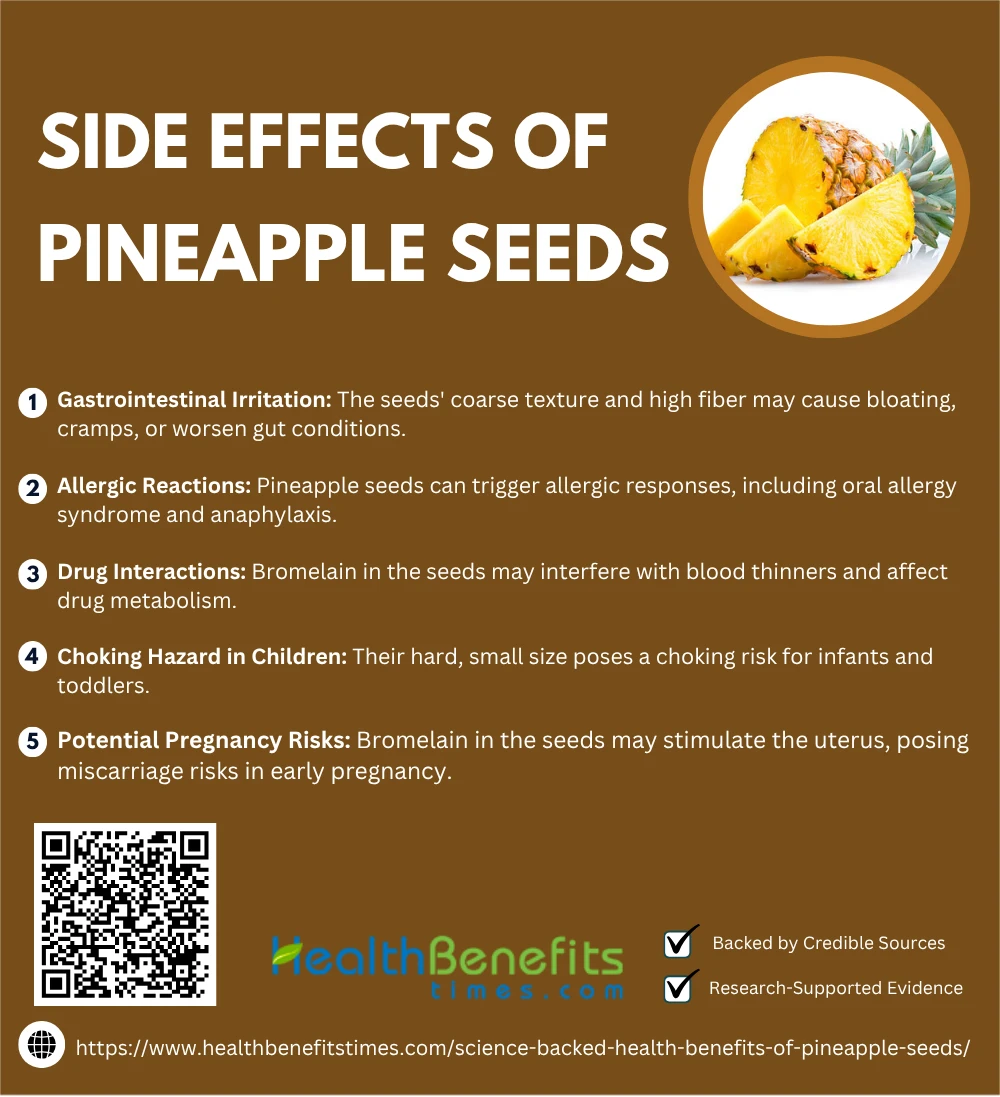 1. Gastrointestinal Irritation
1. Gastrointestinal Irritation
Pineapple seeds, though rich in fiber, can irritate the gastrointestinal tract—especially in those with sensitive digestion or inflammatory bowel conditions. Studies highlight that bromelain and coarse seed texture may worsen digestive upset. (31) Excess fiber may also lead to bloating or cramps and gastrointestinal strain in animal models. (46) (47)
2. Allergic Reactions
Pineapple seeds can trigger allergic responses in sensitive individuals due to cross-reactivity with fruit allergens. Studies highlight cases of oral allergy syndrome and anaphylaxis linked to pineapple components. (48) Allergens in pineapple pulp and seeds have been linked to IgE-mediated hypersensitivity and fruit sensitization in children. (49) (50)
3. Drug Interactions
Pineapple seeds contain bromelain, a proteolytic enzyme that may interfere with anticoagulants and blood pressure medications. Clinical evidence shows it can enhance bleeding risks when combined with warfarin or aspirin. (41) Bromelain’s activity also affects platelet aggregation and can disrupt drug metabolism pathways in sensitive patients. (51) (43)
4. Choking Hazard in Children
Due to their small, hard structure, pineapple seeds pose a significant choking hazard to infants and toddlers. Pediatric dietary guidelines recommend avoiding whole seeds in early childhood. (39) The immature digestive tract struggles with fibrous seed material, increasing the risk of aspiration and esophageal obstruction. (31) (40)
5. Potential Pregnancy Risks
Pineapple seeds contain bromelain, an enzyme linked to uterine stimulation that may increase the risk of miscarriage during early pregnancy. Clinical studies advise avoiding pineapple products in the first trimester due to their uterotonic effects. (52) Bromelain’s ability to soften the cervix and stimulate labor has been documented in labor studies (UGA Dissertation). Nutritionists further recommend caution for seed intake during sensitive gestational periods. (53)
Conclusion
Pineapple seeds, often overlooked, are emerging as a nutrient-dense part of the fruit with impressive health benefits supported by scientific research. Rich in antioxidants, fiber, and anti-inflammatory compounds, they contribute to improved digestion, heart health, immune function, and blood sugar regulation. While more research is needed to fully understand their therapeutic potential, incorporating pineapple seeds in moderation can be a valuable addition to a balanced diet. However, individuals with allergies or specific health concerns should consult a healthcare provider before consumption. Embracing the whole fruit, including its seeds, promotes sustainability and unlocks new pathways to natural health and wellness.


